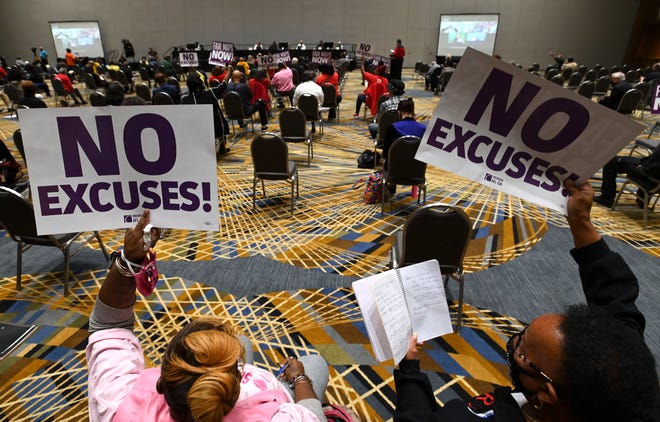AG got redistricting opinion wrong, commission lawyer says
A lawyer for the Michigan Independent Citizens Redistricting Commission said Wednesday he disagrees with parts of an attorney general's opinion that memos discussed in a closed-door session of the group should be made public.
During a virtual meeting Wednesday with members of the Michigan Press Association, David Fink, an attorney retained by the commission, said he had "deep respect" for Attorney General Dana Nessel but criticized her position.
"Without being terribly specific, I don't agree with everything," he said. "Now in part ... that’s because she necessarily drew some inferences from the titles of documents that weren't reviewed. And so that can result in some of the reasoning might be appropriate but not apply to these documents."

Nessel's opinion, issued Monday, said that the commission shouldn't have met in closed session Oct. 27 and shouldn't keep secret the documents that were discussed. She said that the Michigan Constitution requires the commission to "conduct all of its business in open meetings" and publish data and materials that guided proposed political boundaries for the state House, state Senate and U.S. House.
Her opinion was based on the presumption that the documents discussed, entitled "Voting Rights Act" and "History of Discrimination in the State of Michigan and its Influence on Voting," were related to the commission's business of redistricting.
Fink said he disagreed with "part of the legal analysis, but I don't think it would be constructive to address exactly what that is right now."
"Some of the basic principles ... we can’t argue with and nobody would argue with," he said of Nessel's opinion. "But the ultimate conclusions, I think, are based on a couple of leaps that I wouldn't have taken."
A response to the opinion by the commission's legal counsel would be available before the commission next meets on Dec. 2, Fink said. It is expected to discuss whether to make the documents public.
The commission has denied the conservative group Michigan Rising Action's request for the memos and recordings related to the meeting. The Detroit News and other media entities also requested the release of the memos.
The virtual meeting was attended by attorneys representing the commission and representatives of the Michigan Press Association, including top officials of Bridge Michigan, the Detroit Free Press and The Detroit News.
“The Detroit News feels strongly that the Constitution means exactly what it says: ‘The commission shall conduct all of its business at open meetings,’” said Gary Miles, Editor and Publisher of The News, who participated in the meeting. “For this commission to privately receive recommendations on what it must consider in redrawing political maps is to undermine the credibility of its efforts. The antidote to secrecy is light, so these secret documents should immediately be part of the public record for all to see.”
Julianne Pastula, the commission's general counsel, said action relating to the opinion would not be taken before the Dec. 2 meeting.
The documents and recordings relate to the Oct. 27 closed session the commission entered to discuss the two memos from its attorneys.
The commission, created in 2018 in an effort to increase transparency in the redistricting process, is responsible for the once-in-a-decade task of redrawing boundaries for Michigan's state legislative and congressional districts.
The commission's legal counsel argued the hour-and-a-half closed meeting was allowed because the documents were exempt from disclosure under the Freedom of Information Act and the state's separate Open Meetings Act, which allows private sessions if the material is "exempt from disclosure by state or federal statute." The counsel also contended no business was conducted during the closed-door session.
Andrew Pauwels, a lawyer for Honigman who represents The News, described the issue as "outside of the scope of those statutes and the Attorney General's opinion is something that we hope provides guidance on how to move forward."
Like the attorney general, counsel for the media entities contended that the commission is bound by the more sweeping language of the state constitution.
State Sens. Jeff Irwin, D-Ann Arbor, and Ed McBroom, R-Vulcan, asked Nessel to issue an opinion to clarify whether the closed session violated the constitution.
In her opinion Monday, Nessel said that attorney-client privilege has its roots in common law and could apply to the commission so long as the shield wasn't "repugnant" or in opposition to the commission's constitutional mandate to conduct its business in public and to publish "all data" and "all supporting materials" used in the mapping process. But that didn't appear to be the case in this instance, she wrote.
Fink said he saw the opinion as "definitely leaving open the many circumstances in which an attorney-client document is not released."
"I don't see this as saying everything is public and that every meeting is public."
He also pushed back against criticism the commission was being secretive.
"It really is a much more open process than any political process I've ever seen," he said. "It just may not be as open as you’d like it to be."